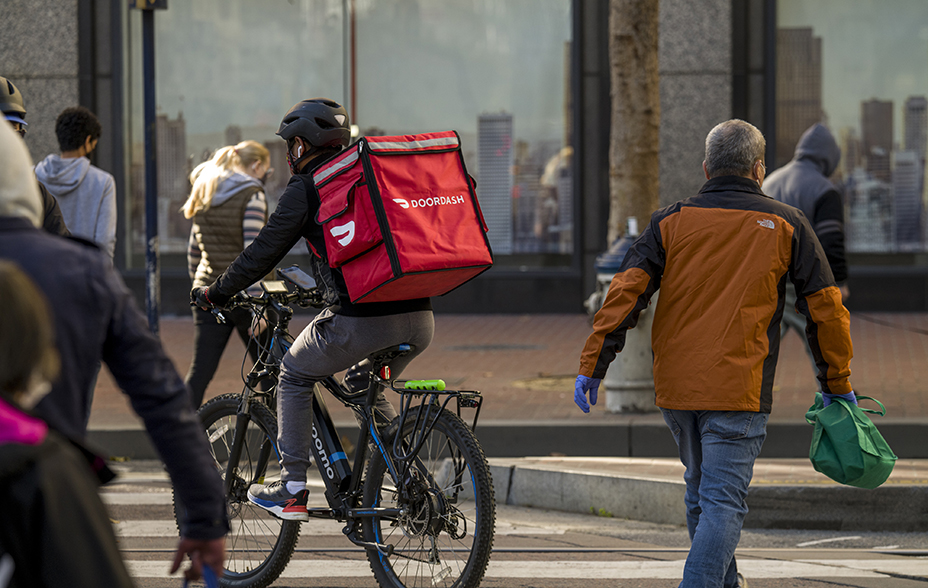Key Points
- Monks seeks far-sighted companies using technologies that can thrive in hard times
- Many of the next decade’s winners will be found in the cloud, data, and artificial intelligence
- A long-term outlook helps Monks find winners overlooked in the scramble for quick gains

© Bloomberg/Getty Images
All investment strategies have the potential for profit and loss, capital is at risk. Past performance is not a guide to future returns.
Fred Smith, founder of FedEx, was right:
“The best way to predict the future is to create it.”
When he started the US logistics business in 1971, times were tough. Energy prices were sky-high, interest rates and inflation were ramping up (record highs were clocked in the early 80s) and unemployment was on the rise.
A former marine, Smith saw the need for rapid shipment of goods as companies sought to manage inventories and maintain cash flow in a difficult environment. FedEx went on to pioneer the hub-and-spoke delivery system and was an early adopter of technology – think barcodes and scanners to facilitate the tracking of goods.
Recessions in the 1980s and again in 2008 sandwiched the dotcom bubble in 2000, but FedEx focused on customer needs and efficient technology. It remains one of the world’s leading logistics companies. FedEx has thrived because of hard times, not despite them.
The Monks portfolio invests in a range of companies that are similarly far-sighted, whose deflationary offerings matter more amid widespread belt-tightening. For example:
- Adyen: the Dutch payments business is growing revenues strongly while charging merchants less and less to facilitate global transactions.
- Datadog: a cloud services business in the US, is growing revenues at up to 30 per cent per year and has increased multi-service customers over 40 per cent. ‘Observability’ software allows companies to monitor performance in real time.
New growth frontiers: creating the future
If the growth engines of the past decade were the internet, mobile, and software, the next decade will be based on the cloud, data, and artificial intelligence. AI has exploded onto the scene with generative AI models such as ChatGPT. Some 100 million people signed up within two months of its launch, thought to be the fastest adoption rate of any new technology in history.
We know better than to be too precise in our predictions about the applications of nascent technologies, but we’re confident the AI revolution will need a lot of data and computing power. Monks has investments in a range of ‘digital frontier’ companies, amounting to more than a third of the portfolio, that may directly benefit from AI. This includes enterprise cloud operators, semiconductor companies, and next-generation ecommerce operators. Microsoft, which has had a stake in OpenAI since 2019, has already begun optimising its Bing search engine and its suite of cloud-based enterprise software applications and Shopify has begun allowing customers to discover products through intelligent chatbot conversations. AI’s tentacles are far-reaching – Tesla has a significant data-gathering advantage over peers thanks to its vast fleet of EVs, which will reinforce its self-driving capabilities.
The ‘picks and shovels’ category underpinning many of these applications is semiconductors. We have been growing the portfolio’s exposure across the semiconductor value chain for some time (just under 6 per cent of the portfolio at end June). We supplemented longstanding holdings in TSMC (manufacturing) and Teradyne (testing), with new positions in:
- Analog Devices (analog semis)
- Entegris (cleaning and filtration systems)
- ASM International (wafer processing),
- Advanced Micro Devices (central processing)
- NVIDIA (graphics processing)
All of these companies benefit from the need for ever-increasing computing power. NVIDIA is a market leader in graphics processing units (GPUs) central to the deep-learning market. Around 90 per cent of generative AI programs are trained on NVIDIA hardware, and three million of the world’s machine learning engineers (that’s nearly all of them) have used NVIDIA’s tools to design new neural networks. Recent share price gains reflect much fanfare, but the scale and likely growth of the addressable market underpins our optimism about future returns. So much so that we also bought Advanced Micro Devices (AMD). While this investment case is predicated mainly on ability to take increasing share from Intel in the central processing unit (CPU) market, we’re optimistic that there’s sufficient room for AMD’s more nascent GPU offering to do well alongside NVIDIA. The latter’s dominant position in GPUs as a fundamental enabler of AI model-learning is promising.

© Bloomberg/Getty Images
‘Increased returns from patience’: backing our winners
In periods of fear and uncertainty, time horizons shrink, and investors focus on the here and now. As long-term investors, this heightens our advantage and allows us to back winners whose valuations appear anomalous. This has been the case in two main areas.
The first is transaction-based, online platforms. Fears of weakening consumer demand and continued investment have given us the opportunity to add to:
- Amazon (ecommerce and cloud)
- Doordash (food delivery)
- Mercado Libre (ecommerce and payments)
The share prices of these companies have been weak. The fact that these companies invested significantly throughout the pandemic is a source of angst for many investors, but we see it differently. There is every chance these companies have effectively entrenched their competitive positions and are set to grow into their pandemic-era investments. In the case of Doordash, what began as a US-focused food delivery business is successfully moving into new markets such as grocery and convenience goods and going global. It is growing revenues at 35 per cent, increasing its take rate for food delivery year-over-year and growth is self-funded. Doordash is striving to become a third-party platform, bringing local merchants together with customers by reimagining last-mile delivery and logistics. We are excited about its ability to revolutionise local delivery services in the US and beyond.
The second cohort relates to the search for returns on advertising spend. In an environment where careful management is needed, we are confident that Monks’ holdings should excel. We have therefore added to positions in Meta, where we believe its core social media platforms are under-monetised, and The Trade Desk, which specialises in programmatic advertising. Its key edge is its software platform which, as it scales, allows corporate customers to precisely targeted advertising. To give a sense of scale, The Trade Desk scans 14 million advertising impressions every second, buying around 1,000 of the most relevant ones. Having recently signed Ocado, Walmart, Target, and Walgreen as partners, this portfolio holding is growing three times faster than the overall advertising market.
Looking ahead
When FedEx floated on the New York Stock Exchange in 1978, the skilled (or indeed just lucky!) investor who bought and held the shares, would have made a 19-fold return (to the end of June 2023), more than twice the global market average. Difficult periods underline the need for foresight, adaptability, and relevance. These characteristics are all present in Monks’ portfolio, particularly in holdings operating in new growth frontiers such as AI.
With all the usual caveats around market estimates, today's portfolio is forecast to deliver over twice the earnings growth rate of the wider market three years out, all for a comparatively modest valuation premium of 20–25 per cent (depending on your measure). Our research pipeline is strong, and the opportunity set is broadening. We will continue to back the winners in the portfolio and leverage our ability to invest across the growth spectrum – including a strong cohort of companies that thrive in difficult times.
| 2019 | 2020 | 2021 | 2022 | 2023 | |
| Monks Share Price |
9.5 | 15.3 | 30.2 | -32.1 | 6.8 |
| FTSE World Index | 10.4 | 5.8 | 25.5 | -2.8 | 13.5 |
Performance source: Morningstar, FTSE, total return in sterling.
Important information
The investment trusts managed by Baillie Gifford & Co Limited are listed UK companies. The value of their shares, and any income from them, can fall as well as rise and investors may not get back the amount invested.
The Trust invests in overseas securities. Changes in the rates of exchange may also cause the value of your investment (and any income it may pay) to go down or up.
The Trust's risk could be increased by its investment in private companies. These assets may be more difficult to sell, so changes in their prices may be greater.
This information has been issued and approved by Baillie Gifford & Co Limited and does not in any way constitute investment advice.
Ref: 57648 10031872




